Related Research Articles
John Dee Loudermilk Jr. was an American singer and songwriter. Although he had his own recording career during the 1950s and 1960s, he was primarily known as a songwriter.

"Hold Me, Thrill Me, Kiss Me" is a song written by Harry Noble and originally performed by Karen Chandler in 1952. It has been re-recorded several times since then, the most notable covers being by Mel Carter in 1965 and Gloria Estefan in 1994.
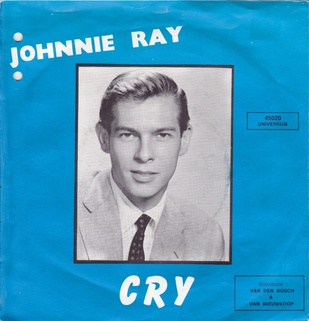
"Cry" is a 1951 popular song written by Churchill Kohlman. The song was first recorded by Ruth Casey on the Cadillac label. The biggest hit version was recorded in New York City by Johnnie Ray and The Four Lads on October 16, 1951. Singer Ronnie Dove also had a big hit with the song in 1966.
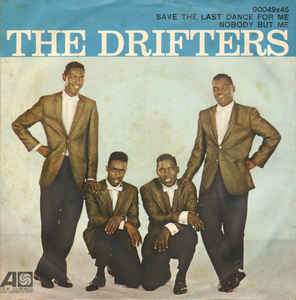
"Save the Last Dance for Me" is a song written by Doc Pomus and Mort Shuman, first recorded in 1960 by American musical group the Drifters with Ben E. King on lead vocals. It has since been covered by several artists, including Dalida, the DeFranco Family, Emmylou Harris, Dolly Parton, and Michael Bublé.
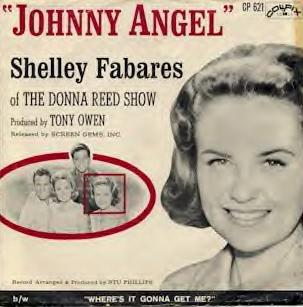
"Johnny Angel" is a song written and composed by Lyn Duddy and Lee Pockriss. It was originally recorded by both Laurie Loman and Georgia Lee, but those two versions were not successful. It first became a popular hit single when it was recorded by Shelley Fabares in the fall of 1961; she took it to number 1 on the Billboard Hot 100 Chart when the song was released in 1962. In the same year, British singer Patti Lynn had a moderate hit on the UK Singles Chart with her cover of the song. The American pop music duo The Carpenters recorded "Johnny Angel" in 1973 as part of a medley of oldies on side two of their album Now & Then.
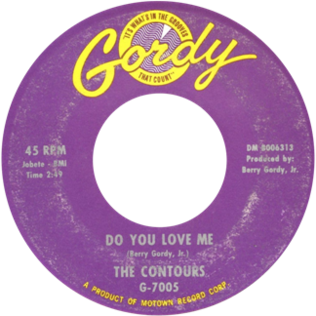
"Do You Love Me" is a rhythm and blues song recorded by the Contours in 1962. Written and produced by Motown Records owner Berry Gordy Jr., it appeared twice on the Billboard Hot 100 chart, reaching numbers three in 1962 and eleven in 1988.

"Don't Make Me Over" is a song written by Burt Bacharach and Hal David, originally recorded by American singer Dionne Warwick in August 1962 and released in October 1962 as her lead solo single from her debut album, Presenting Dionne Warwick (1963), issued under Sceptor Records. The song reached number 21 on the US Billboard Hot 100 and number five on the Billboard Hot R&B Singles chart.

"The End of the World" is a pop song written by composer Arthur Kent and lyricist Sylvia Dee, who often worked as a team. They wrote the song for American singer Skeeter Davis, and her recording of it was highly successful in the early 1960s, reaching the top five on four different charts, including No. 2 on the main Billboard Hot 100. It spawned many cover versions.

"The Wanderer" is a song written by Ernie Maresca and originally recorded by Dion, released on his 1961 album Runaround Sue. The song, with a 12-bar blues-base verse and an eight-bar bridge, tells the story of a travelling man and his many loves. The song is ranked number 243 on the Rolling Stone magazine's list of The 500 Greatest Songs of All Time.

"Break It to Me Gently" is a pop song written by blues musician Joe Seneca with lyrics by Diane Lampert. Both Brenda Lee and Juice Newton were met with considerable success with their versions of the song.

Sue Thompson was an American pop and country music singer. She is best known for the million selling 1961 hits "Sad Movies " and "Norman", "James " (1962), and "Paper Tiger" (1965).
"Someday You'll Want Me to Want You" is a popular song published in 1944 by Jimmie Hodges. The song became a standard, recorded by many pop and country music singers.

"Cry for You", released as "Cry for You (You'll Never See Me Again)" on Hard2Beat, is a song by Swedish singer Petra Marklund, performing as September, from her second studio album In Orbit (2005). It was released in Sweden on 29 November 2006 as the third and final single from the album. The single version was also included on her third studio album Dancing Shoes (2007) as a bonus track, and it was released as a single from her various compilation albums that were released in Europe. Musically, "Cry for You" is a dance-pop and euro-pop track, with it lyrically being about getting out of a relationship.

Carol Deene is an English pop singer and radio host who achieved success in the early 1960s.

"Then You Can Tell Me Goodbye" is a song written by John D. Loudermilk. It was first released in 1962 by Don Cherry, as a country song and again as a doo-wop in 1967 by the group The Casinos on its album of the same name, and was a number 6 pop hit that year. The song has since been covered by Eddy Arnold, whose version was a number 1 country hit in 1968, and by Neal McCoy, whose version became a Top 5 country hit in 1996.
"Funny How Time Slips Away" is a song written by Willie Nelson and first recorded by country singer Billy Walker. Walker's version was issued as a single by Columbia Records in June 1961 and peaked at number 23 on the Hot C&W Sides chart. The song has been featured in several live action films and television shows, such as in the first episode of the second season of AMC’s Better Call Saul and in the 2020 Netflix drama The Devil All the Time.

"Norman" is a popular song written by John D. Loudermilk. Recorded by Sue Thompson in 1961, the song reached No. 3 on the Billboard Hot 100. The next year, Carol Deene released her version of the song in the United Kingdom, where it reached No. 24 on the UK Singles Chart. Guy Lombardo recorded a version of the song for his 1962 Decca LP By Special Request.

Anthology is a compilation album by country pop singer Juice Newton. It was originally released by Renaissance Records on October 13, 1998. The album covers her career from 1975 to 1989 and features 19 songs taken from her albums Juice Newton & Silver Spur, Juice, Quiet Lies, Can't Wait All Night, Old Flame, Emotion, and Ain't Gonna Cry. However, it includes the 1975 take of "The Sweetest Thing " from the first RCA album, not the 1981 hit version from Juice.
"Cuando calienta el sol" is a popular Spanish language song originally composed as "Cuando calienta el sol en Masachapa", Masachapa being a coastal town in Nicaragua. The music was written by Rafael Gaston Perez, a Nicaraguan songwriter and bandleader. SADAIC also credits the Argentine composer Carlos Albert Martinoli.
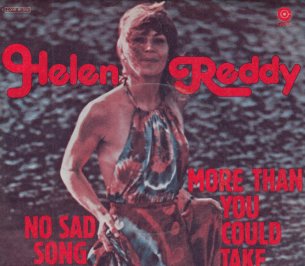
"No Sad Song" is a song written in 1971 by Carole King and Toni Stern. It was recorded by Australian singer-songwriter Helen Reddy, appearing on her album Helen Reddy, released in November 1971. The single peaked at number 62 in January 1972 on the Billboard Hot 100 chart, staying on the chart for eight weeks. "No Sad Song" showed up on the Easy Listening chart for 4 weeks, rising to number 32. It also reached number 51 on the pop chart in Canada's RPM magazine.
References
- ↑ Thompson biography from allmusic.com Retrieved 02-15-09.
- 1 2 3 Hyatt, Wesley (1999). The Billboard Book of #1 Adult Contemporary Hits (Billboard Publications), page 4.
- ↑ Whitburn, Joel (2004). The Billboard Book of Top 40 Hits, 8th Edition (Billboard Publications), page 631.
- ↑ Thompson Official Charts Company info from Official Charts Company Retrieved 02-15-09.
- ↑ Deene Official Charts Company info from Official Charts Company Retrieved 02-15-09.
- ↑ Video on YouTube